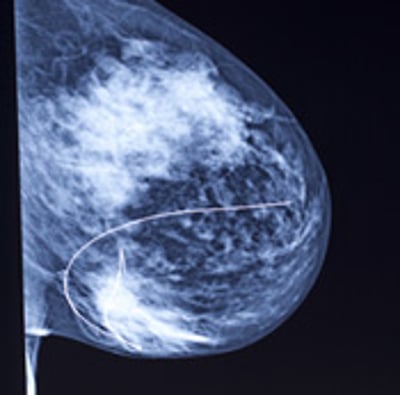All XRAYs



Relevance: Medium-High
Most relevant for: Women diagnosed with breast cancer who have received antidepressants
Study: Does prior antidepressant use affect the treatment breast cancer patients receive?
Previous research found an association between depression and survival in breast cancer patients, but the reasons for this association are unclear. Researchers in this study found that women who had been previously prescribed antidepressants were less likely to receive breast cancer treatment that followed national guidelines than those who had not. Although the difference was small, it underscores the need for patients to discuss any history of depression with their health care providers. (1/24/17)
READ MORE ›


Relevance: Medium-High
Most relevant for: People with breast cancer symptoms
Study: Women with breast cancer symptoms but no lump may wait longer to seek medical care
Some patients take longer than others before getting a potential breast cancer checked by their health care provider. Believing that women who have breast cancer symptoms but have no lump may wait longer, researchers in this study used data from women who were diagnosed with breast cancer in 2009 and 2010 to identify possible explanations. (1/18/17)
READ MORE ›


Relevance: Medium-High
Most relevant for: Women at average risk for breast cancer and newly diagnosed women
Study: High vitamin D levels at breast cancer diagnosis may be associated with a better prognosis
Vitamin D is most known for its role in maintaining bone health but vitamin D has additional roles in keeping us healthy. In this study, researchers found that breast cancer patients who had the highest amounts of vitamin D in their blood (slightly over the recommended levels) had better health outcomes, including overall survival, than women with lower amounts of vitamin D. This finding adds to the growing evidence for the role of vitamin D in cancer, but it does not change how breast cancer is prevented or treated. (1/10/17)
READ MORE ›


Relevance: Medium
Most relevant for: People interested in genetic testing for an inherited mutation
Study: Angelina Jolie spoke out on BRCA testing: Did genetic testing increase?
Angelina Jolie published an editorial in the New York Times in 2013 about her choice to have a double mastectomy after finding out she was positive for a BRCA1 mutation. Researchers from a recent study claim that her celebrity endorsement of BRCA testing may have missed its target audience (previvors), due to the increase in BRCA testing following publication of the editorial but a decrease in the number of mastectomies performed. However, the study failed to take into account that many women without breast cancer do not pursue mastectomy in the months following genetic testing. (1/4/17)
READ MORE ›


Relevance: Medium-High
Most relevant for: Woman who are facing mastectomy
Article: After mastectomy: reconstruct or not?
Today, more women know they can have breast reconstruction after removing their breasts for cancer treatment or risk reduction. But what about choosing not to undergo reconstruction? Roni Caryn Rabin writes about the experiences of women who decide against reconstruction in her New York Times piece “‘Going Flat’ After Breast Cancer.” (12/14/16)
READ MORE ›


Relevance: Medium
Most relevant for: People with Her2-positive breast cancer
Article: Headlines claim drug combination destroys tumor in 11 days—is this too good to be true?
A recent IFLScience headline proclaimed "Remarkable Breast Cancer Trial Destroys Tumors in Just 11 Days." This sounds amazing but it leaves out key facts. First, the finding applies only to HER2-positive breast cancer, not all breast cancers. More importantly, the results are from a conference presentation and have not yet appeared in a peer-reviewed scientific journal. What does that mean for breast cancer patients? (12/6/16)
READ MORE ›


Relevance: Medium-High
Most relevant for: Men diagnosed with breast cancer
Personal Story: Men get breast cancer too
Cathy Free's piece for People, “Men Have Breasts Too: New York Man Who Survived Stage 2 Breast Cancer Spreads Message,” tells the stories of two men whose experiences with breast cancer inspired them to speak openly about breast cancer awareness for men. (11/29/16)
READ MORE ›


Relevance: Medium-High
Most relevant for: People diagnosed with breast cancer
Study: Cancer treatment costs can vary widely
Healthcare providers cannot give their breast cancer patients information on chemotherapy treatment costs because not enough is known about the exact costs. New research finds that costs vary not only between different cancer treatments, but also between similar treatments, such as all treatments that target HER2+ breast cancer. (11/22/16)
READ MORE ›


Relevance: Medium
Most relevant for: People considering genetic testing and people who are Ashkenazi Jewish
Personal Story: Why one woman passed on genetic testing
What are reasons to get or not get genetic testing? Cynthia Graber gives her thoughts on the matter in her Wired opinion piece, "Why I Won't Get the Genetic Test for Breast Cancer." (11/15/16)
READ MORE ›


Relevance: Medium-High
Most relevant for: Women diagnosed with metastatic breast cancer
Personal Story: CBS News brings attention to the issues facing young metastatic breast cancer patients
Beth Caldwell is a former civil rights lawyer, a mother of two, and a wife who was diagnosed with stage 4 metastatic breast cancer when she 37. Mary Brophy Marcus covered Beth’s story in her piece, “The hardest part” of breast cancer under 40, for CBS News. (11/8/16)
READ MORE ›